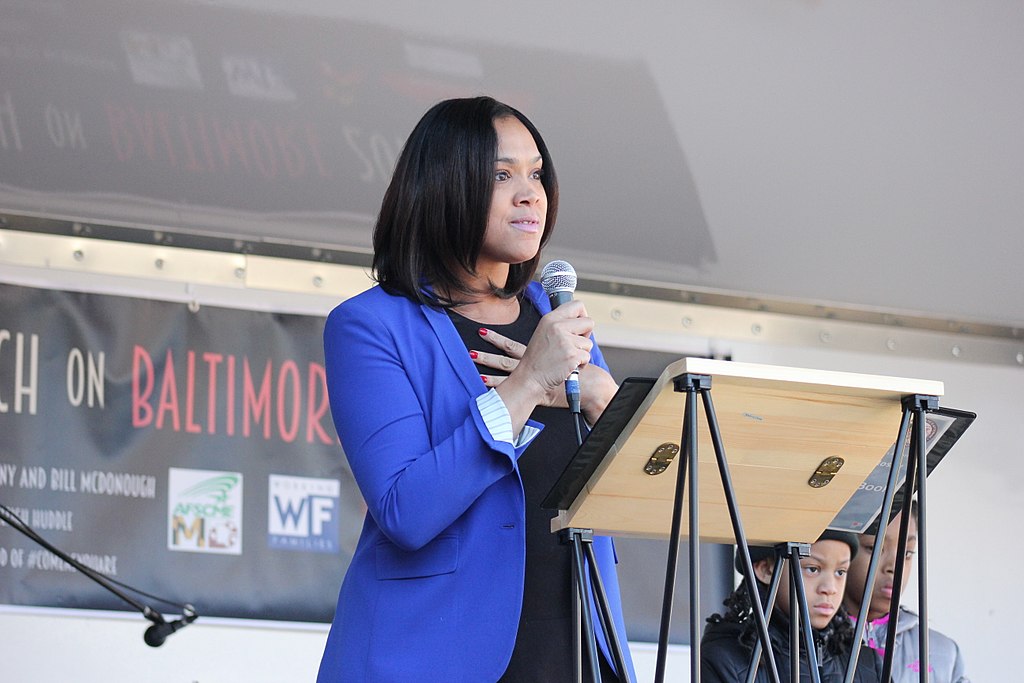Views expressed in opinion columns are the author’s own.
In May 2015, Baltimore State’s Attorney Marilyn Mosby addressed a city roiled by protests, announcing her intent to charge all six of the officers involved in the arrest of a young black man named Freddie Gray, who had died shortly after being taken into police custody. A medical examiner’s report deemed Gray’s death a homicide.
In a now-famous speech, Mosby forcefully yet cogently outlined her intentions and affirmed protesters and young people across the country, saying: “To the people of Baltimore and the demonstrators across America, I heard your call for ‘no justice, no peace.'”
She continued, “Your peace is sincerely needed as I work to deliver justice on behalf of this young man.”
[Read more: Martin O’Malley’s record in Baltimore is atrocious. He shouldn’t be a Democratic Party leader.]
As a Baltimore native, I remember the hope that lingered in the days following this press conference. In the subsequent months, though, it became evident that Mosby’s efforts fell flat. Currently, no officers have been convicted in the death of Freddie Gray, and it does not seem as if any will be.
This particular shortcoming has defined Mosby’s career, while at the same time indicating the notorious bureaucratic gridlock and corruption of politics and policing in Maryland’s largest city.
In February, Mosby filed for re-election as Baltimore’s state’s attorney, as the Baltimore Police Department has continued to garner national attention for the corruption that has become its hallmark.
Currently, Mosby has two opponents: Thiru Vignarajah and Ivan Bates. They’ve both released platforms that address the importance of the state’s attorney at a moment of tension and change in Baltimore, particularly given the rise in crime and corruption throughout Mosby’s tenure.
Bates further expounded this critique, purporting, “Crime’s out of control, the State’s Attorney’s Office is in complete disarray.” He argued that “the message is clear: There’s no accountability within the criminal justice system in Baltimore City.”
What’s most interesting about this state’s attorney’s race is its unforgiving vilification of Mosby. Her opponents’ criticisms are based on failures borne of an already broken justice system — one that resists all attempts at restorative justice and progressand is hampered by organizations like the super PAC Bmore Safe Now and the Baltimore police union, which use their resources and power to dismantle Mosby’s efforts for a systemic overhaul.
[Read more: UMD joins network that aims to attract and retain Baltimore-area students]
This all suggests that instead of dismissing Mosby in the race for state’s attorney, we should give her the attention and respect a seasoned attorney deserves — attention not tinted by the unfair expectations often placed on women, particularly women of color, in positions of power.
Throughout the beginning stages of her campaign, Mosby has remained composed. Rather than being defensive, she’s continually stood by her attempts to seek both justice and reform within a corrupt system that’s done everything in its power to villainize her.
In February, she spoke of how she felt she “went into this to reform the criminal justice system,” and despite many impediments was “able to successfully do that in 18 months.”
In races like this, it’s important to think deeply about the exigence of local elections and the effects they have on the residents of the city. These elections often inform the goings-on of a place far more than any federal election.
In Baltimore, there is already a great amount of tension and doubt swirling around issues of local government — particularly regarding the criminal justice system.
Unlike Vignarajah and Bates, Mosby offers a unique combination of perspective and experience in a city undergoing seismic shifts on how it deals with power and criminal justice. Attributing the negligence and misconduct of entire entities such as the BPD and the government of Baltimore City to one person is not only unfair, it’s deliberately disrespectful.
Sarah Riback is a sophomore English and sociology major. She can be reached at riback.sarah@gmail.com.



